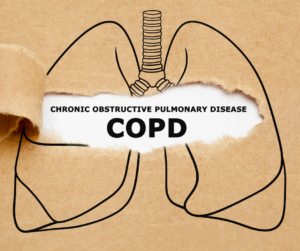What Is COPD?
 Chronic obstructive pulmonary disease (COPD) is a chronic lung disease that causes air flow limitation (less air in and out of the airways) and breathing-related symptoms. There is no cure, but there are ways to manage and treat COPD.
Chronic obstructive pulmonary disease (COPD) is a chronic lung disease that causes air flow limitation (less air in and out of the airways) and breathing-related symptoms. There is no cure, but there are ways to manage and treat COPD.
Key Points
- COPD is chronic. In other words, you live with it every day.
- It is progressive, meaning it gets worse over time.
- COPD is diagnosed by reviewing your medical history, a physical examination and examining your spirometry test results.
- Chronic bronchitis and emphysema are the most common types of COPD. You can be diagnosed with both of these, and this is also called COPD.
How COPD Affects Your Body
Not everyone with COPD has the same symptoms. At first, you may have no symptoms or mild symptoms. As your COPD gets worse, you may have more symptoms like a cough that may bring up sputum (mucus or phlegm) or shortness of breath.
With COPD, less air flows in and out of your airways for one or more reasons:
- Airways in your lungs become narrowed due to being swollen (inflamed) and thickened
- Walls between your air sacs are destroyed
- Airways and tiny air sacs lose their ability to stretch and shrink back
- Airways make more mucus which can clog them and block airflow
When less air flows into your lungs, less oxygen gets into your body tissues. Oxygen, one of the gases found in the air we breathe, is vital for our lungs and organs to work properly. Oxygen is exchanged for waste products or carbon dioxide. Carbon dioxide is removed from the blood stream when you exhale. When it becomes harder to get air in and out of your airways, you may have more breathing-related symptoms.
How is COPD Treated?
Each person’s COPD symptoms and treatment options are different. You and your healthcare team will work together to create a treatment plan that works for you. Your treatment plan will help you control your symptoms and know what to do when your COPD gets worse.
There is no cure for COPD, but treatment options may help you:
- Better control symptoms
- Slow the progression of the disease
- Reduce the risk of exacerbations or flare-ups
- Improve your ability to stay active
What Causes COPD?
Over time, exposure to lung irritants like tobacco smoke or chemicals can damage your lungs and airways. This long-term exposure can cause chronic obstructive pulmonary disease (COPD), which includes chronic bronchitis and emphysema. The leading cause of COPD is smoking, however 1 in 4 people living with COPD never smoked.
- Smoking
- Occupational exposures
- Air pollution
- Alpha-1 Antitrypsin Deficiency
COPD Risk Factors
COPD is often referred to as a “smoker’s disease.” However, although smoking is one of the main risk factors for developing COPD, people who never smoke may also develop COPD. Other risk factors may include:
- A history of childhood respiratory infections
- Smoke exposure from coal or wood-burning stove
- Exposure to secondhand smoke
- People with a history of asthma
- People who have underdeveloped lungs
- Those who are age 40 and older as lung function declines as you age
While these causes and risk factors may increase your risk of developing COPD, people living in poverty and people living in rural areas are more likely to develop COPD. Beyond smoking status, some reasons for the increased risk of developing COPD may include exposures to indoor and outdoor pollutants, occupational exposures and lack of access to healthcare.
Reduce Your Risk for COPD
If you are concerned about developing COPD, you can take steps to reduce your risk.
- Quit smoking for good by finding support, programs, and resources through the American Lung Association.
- Avoid secondhand smoke exposure.
- Stay up to date with your COVID-19, flu, and pneumonia vaccinations. Vaccinations help protect you against respiratory viruses.
- If you are exposed to chemicals, dust, and fumes in your workplace, use appropriate protective equipment and attend safety training.
COPD is a progressive disease, and it can get worse over time. If you have risk factors for COPD or are experiencing symptoms, do not wait to talk to your healthcare provider. The earlier you are diagnosed with COPD, the sooner treatment can begin.
